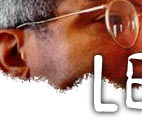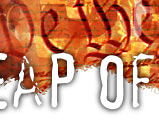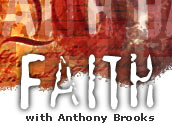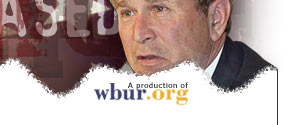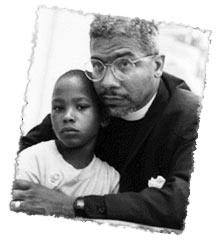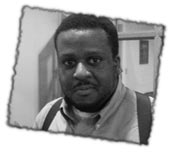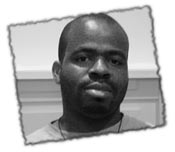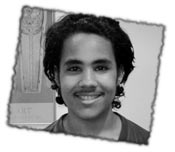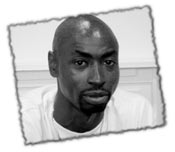In a gabled Victorian house, perched on a hill overlooking Boston
Harbor in Dorchester, the day begins a little after six in the morning
with Bible study and prayer.
This building was once a crack house. Now, it is home to the Azuza
Christian Community Church and the Ella J. Baker House, which provides
an array of after school and youth outreach programs. It's led by
Pastor Eugene Rivers, a 51-year-old Pentecostal, who studied briefly
at Harvard and Yale, but moved here in the 1980's. That's when a
crack epidemic was raging in Boston, and a bright and outspoken
young drug dealer named Selvin Brown challenged the black churches.
Interview with Reverend Eugene Rivers
"So when the bullets fly, and all hell breaks loose... it's the faith that makes the difference."
Recorded in Harvard Square, Cambridge, by reporter
Anthony Brooks
|
 |
|
Brown argued that the reason that a generation of very alienated
young black males held entire communities hostage was because
the black churches had failed to meet a generation on their own
turf.
Back then, Pastor Rivers, who had a penchant for controversy and
an appetite for publicity, took up the call and raged against
his fellow clergymen for ducking their duty. Later, in 1992, the
violence in Boston reached a dramatic climax during a funeral
service at the Morning Star Baptist Church. A gang of hooded men
stormed the church, fired their guns, and cornered one of the
mourners and stabbed him.
Rivers says the Morning Star incident was the "wake up
call to black churches" and an indictment. He recalls, "The
black churches had failed to take their message to the street.
And as a result the street brought its message into the church,
with poetic justice: you were indifferent to us. We will now mount
an assault against you."
Out of The Morning Star attack was born the Ten Point Coalition:
an alliance of Boston clergy committed to ending youth violence
through programs of mentoring and collaboration with law enforcement.
Now, once a week, neighborhood clergy, police and juvenile justice
officials come together at the Baker House. They share coffee
and juice and swap information about potential trouble: who's
out of prison and back on the streets, who's recruiting for gangs
and where.
According to Boston Police Captain Robert Dunford, the collaboration
with the city's black ministers represents an important shift
from the racially charged tension of a decade ago. Then, a meeting
with Rivers would have been "confrontational," he says.
Now, they work together, and Dunford declares, "we cannot
do it alone."
At work is something called the one-in-ten rule. The clergy helps
police identify the relatively few seriously dangerous kids. In
return, the police leave the majority of the less violent ones
in the hands of the clergy. Over the past decade, crime rates
dropped in most American cities by as much as 50 percent. In Boston,
they plummeted by 80 percent, and there was a big drop in civilian
complaints against police. Captain Dunford is among many who say
the ministers played a critical role:
They're the most respected members of the
community, they have a lot of moral authority. When they speak,
even the hardened guy, he stops. I can't do that. I'm a white
police officer. The kid in the street isn't going to pay too much
attention to me. The most important factor is the legitimacy and
the credibility that they've given law enforcement efforts. The
black church is now the most viable institution in the black community.
Eugene Rivers says too many black neighborhoods are still dominated
by crack houses, liquor stores and broken down schools, which leaves
only the churches to fight for real social change. He says it is
because of his faith that he perseveres. His house was shot into
twice, and burglarized six times, he recalls, "but we stayed,
because of our faith. So when the bullets fly, and all hell breaks
loose, and none of the critics are around, it is the faith that
makes the difference."
On this particular, day there's talk of a new wave of car thefts
in one neighborhood, new guns showing up in another, and a spate
of gang fighting in another. It will fall to Andre Norman, a street
worker and the field organizer at the Baker House, to try to intervene
ahead of the police.
We'll go down now, and talk to the guys, as a method
of intervention. So we say, 'Okay, you don't need the police to
come down here, we're getting their heads up, we're coming to
talk to you saying, "Listen, we have some programs over here
for you, there is a whole coalition that is in place to help you,
we're just the front soldiers that come down here to tell you
that it's for real."'
Andre Norman is 32. He served 14 years in jail for armed robbery
and attempted murder. He is now one of Rivers' most trusted lieutenants
and street workers. Today he's trying to help a fellow ex-offender
named Jay Rock, who is struggling with heroin addiction. Rock's
eyes are blood-shot and he looks much older than his 25 years.
He's been out of jail for two years, and says, like a lot of kids
back in the mid-nineties, he was lost in a world of drugs and
guns. At the time, he recalls, it was fun, "like the wild,
wild west."
He saw it as "a rush of adrenaline just knowing that somebody
is shooting at you and you're ducking bullets and running and
diving behind cars. That's what we deemed fun."
When he was 18, the fun stopped. Rock went to jail for armed
robbery and attempted murder and served five years. Now, he says,
he wants off the streets and the heroin. So he called Andre for
help.
There's nothing out there but death and jail, you
know what I mean. Me, I know I'm better than that. Obviously,
he knows I'm better than that, because he's willing to help me.
A few days later Andre Norman and a colleague head to the Community
Academy, a kind of last chance for kids who've been expelled from
public schools across the city. Norman makes weekly visits here,
as he does to jails, juvenile centers, and street corners. He calls it the last stop. "They either sink or swim. Well,
this is the sinking point, and a lot of these kids are going to
fall off and disappear."
Norman came to check up on a 16 year-old we'll call David whom
he first met in a juvenile detention center two months earlier.
David has been pulled out of the classroom for fighting, and he
warns him he could face expulsion. He says he can give David a
summer job if he can clean up his act.
Norman wears a small wooden cross around his neck. He tells about
a religious conversion he had in jail that saved his life. Although
he says he doesn't "hit people over the head with a Bible,"
his work is motivated by faith. "I don't have to go out and
scream 'God, God, God,'" he declares, "I live it, I
bring it, I've been taught it, and through what I've taught, I
share."
Eugene Rivers says ex-offenders like Norman, who have turned
their lives around, are powerful witnesses and examples of the
crucial role faith can offer a generation of young people lost
in urban America:
For someone like Andre, to know that he is loved
and forgiven, is very healing, it's redemptive, it facilitates
renewal, psychologically and culturally, and it gives my life
meaning - capital "M."
Inside, Baker House, the atmosphere isn't overtly religious.
There are no crosses on the walls, though staff and clients can
attend morning and evening prayers and Sunday services downstairs.
The Baker House operates its youth programs with a mix of private
and public money. Rivers is not among those who claim that religion
in and of itself saves these kids. But it is what compels him
to try to help them.
We recognized that there are a lot of young black
people, that they did not want to hear a religious message, they
wanted to see sacred institutions produce secular outcomes, which
would benefit the lives of young black people. It was then and
only then that the young people themselves initiated inquiries,
regarding the nature of our faith.
Because the government is committed to such"secular outcomes"
as literacy, job training, and mentoring, Rivers argues it's appropriate
that it support this kind of work with money. He didn't vote for
George W. Bush, but he says small black churches need financial
help, so he welcomes the President's plan. For Rivers, it isn't
about ideology. Like a lot of people, he's willing to combine
a bit of pragmatism with his religious fervor.
We are willing to judge the Republicans by their
works, and while we love the fact that the Democrats love the
good colored churches, rhetoric would be preferred to resources
at the end of the day… I'm amused that critics assume the colored people don't
have the intelligence and sophistication of the big white people.
Buckwheat, you need to stay on the plantation. Master Democrat
don't want you leaving his plantation to go over to Master Bush's
plantation.
At the Republican-sponsored faith-based summit in Washington
this past spring, speaker after speaker talked about how a closer
church-state collaboration would lift up communities in need.
Coalition Against Religious Discrimination
from a speech April 24th, 2001
|
Barry
Lynn
Executive Director of Americans
United for Separation of Church and State.
|
 |
Welton
Gaddy
Executive Director of the Interfaith
Alliance.
|
 |
Rabbi
Amy M. Schwartzman
Senior Rabbi at the Temple Rodef Shalom, Falls Church,
Virginia. |
 |
|
The President has yet to convince key Congressional moderates
that this is a good idea. And with the Senate now in Democratic
hands, it's not clear what part of his program on faith-based
initiatives, if any, will become law. Whether or not the money
comes, the president's supporters in the faith community say his
effort has energized their work.
Those who have been pushing for government funding of religious-based
programs say the president's initiative is only the most recent
and it will not be the last. Those opposed, meanwhile, will continue
to warn that direct government funding of church programs not
only threatens individual freedom, but the vitality of the churches
themselves.
Welton Gaddy heads the Interfaith Alliance. He argues that if
the president and his allies really want to help the poor, they
should increase the budget for social programs, rather than just
divide the same pie into smaller pieces and pit congregations
against each other. Gaddy also worries that the Bush plan would
compromise the churches' ability to be the nation's conscience.
"When in the history of religion have you ever known a prophet
who would speak truth to power when the power was paying the salary?
That's where we are going with the government co-opting religion."
Others call the story of America a long history of government
and church working together. In his Notre Dame commencement speech
on May 20, 2001, President Bush called on the audience to "just
look around."
Public money already goes to groups like centers
for the homeless and on a larger scale to Catholic charities.
Do the critics really want to cut them off? Medicaid and Medicare
currently go to religious hospitals. Should this practice be ended?
Childcare vouchers for low-income families are redeemed every
day at houses of worship across America. Should this be prevented?
Government loans send countless students to religious colleges.
Should this be banned? Of course not.
The president's opponents don't dispute the extent to which church
and state are already entwined, but they say his plan would dramatically
alter a delicate balance. The debate will continue among politicians,
preachers, pundits, and activists of all kinds, one side calling
for the government to place our dollars where religious belief
can do good, the other trying to head off what it considers a
dangerous leap of faith.
